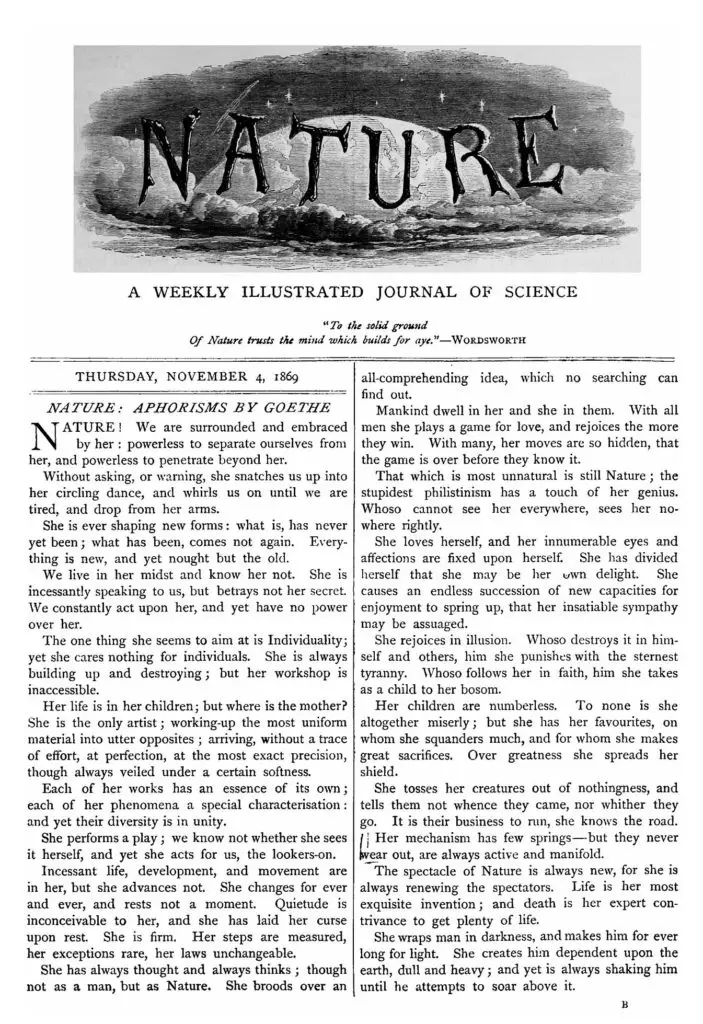Nature is the most recognized scientific multidisciplinary journal in the world. More than a century the journal’s contribution to the scientific community is remarkable. but many of the researchers do not know the timeline and facts about Nature journal.
In this article, ilovephd provides 50 interesting factors about the Nature Journal.

50 Interesting Facts about the Nature Journal
- Founded in 1869: Nature was first published in 1869, making it one of the oldest scientific journals in the world.
- International Readership: It has a vast global readership, with subscribers and readers from various countries.
- Diverse Content: Nature covers a wide range of scientific disciplines, including biology, physics, chemistry, and more.
- Impact Factor: It consistently ranks among the journals with the highest impact factors, reflecting its influence in the scientific community.
- Weekly Publication: Nature publishes new research and articles every week, ensuring that readers stay updated on the latest scientific discoveries.
- Interdisciplinary: The journal often features interdisciplinary research, promoting collaboration across scientific fields.
- Open Access: Some articles in Nature are available for free, promoting open access to scientific knowledge.
- Peer Review: All articles undergo rigorous peer review to maintain high-quality content.
- Nature Index: It publishes the Nature Index, a database that tracks research output and collaboration.
- Nobel Laureates: Many Nobel laureates have published their research in Nature.
- Online Presence: Nature has a strong online presence, with a website and social media accounts.
- Science News: The journal also features news and commentaries on current scientific events and issues.
- Editorial Independence: Nature prides itself on editorial independence and unbiased reporting.
- Nature Reviews: It includes Nature Reviews, which provide in-depth analysis of key topics in science.
- Nature Communications: A multidisciplinary, open-access journal published by Nature Publishing Group.
- Highly Cited: Many articles in Nature receive high citation rates.
- Historical Impact: It has played a pivotal role in publishing groundbreaking research, such as the discovery of the structure of DNA.
- Online Communities: Nature hosts online communities where researchers can discuss various scientific topics.
- Nature Portfolio: Nature is part of the Nature Portfolio, which includes other journals like Scientific Reports.
- Earth and Environment Focus: Nature publishes research on environmental and Earth sciences.
- Science Outreach: The journal is involved in various science outreach programs and initiatives.
- Peer-Reviewed Review Articles: Nature publishes review articles that summarize the latest research in specific fields.
- Nature Briefing: It offers a daily email newsletter, “Nature Briefing,” to keep readers informed.
- Astronomy and Space Research: Nature features research on astronomy and space-related topics.
- Nature Masterclasses: Offers online training courses for researchers and scientists.
- Podcasts: Nature offers podcasts on various scientific topics.
- Archives: The journal maintains an extensive archive of past issues and articles.
- Award-Winning Journalism: Nature’s Journalism has received awards for its quality.
- Innovative Research: It showcases innovative and groundbreaking scientific research.
- Nature Outlooks: Special features on emerging scientific trends and topics.
- Climate Change Coverage: Nature extensively covers climate change and its effects.
- Science Jobs: The journal has a job section for career opportunities in science.
- Research Highlights: Summaries of key findings in scientific research.
- Science Events: Nature promotes and covers scientific conferences and events.
- Book Reviews: Reviews of notable scientific books and publications.
- High-Resolution Images: Many articles include high-quality images and figures.
- Nature Methods: Focuses on new methods and techniques in research.
- Archival Collections: Special collections of historical scientific content.
- Young Scientist Awards: Nature recognizes young scientists for their contributions.
- Science Policy: Features articles on science-related policy and advocacy.
- Online Commenting: Readers can comment on articles, promoting discussion.
- Science Careers: Articles on career development and opportunities in science.
- Scientific Ethics: Nature addresses ethical considerations in research.
- Multimedia Content: Includes videos, animations, and interactive features.
- Science Writing Workshops: Nature offers training for science communication.
- Nature Conferences: Organizes conferences on various scientific topics.
- Science Artwork: Many articles feature scientific illustrations and artwork.
- Science Journalism Awards: Recognizes excellence in science reporting.
- Data Availability Statements: Emphasizes data availability and transparency.
- Nature Outlooks: Special features on emerging scientific trends and topics.
Hope, this article helps you to know interesting information about the Nature Journal.
Also Read:
10 Interesting Facts About Sci-HuB
10 Interesting Facts About Researchgate
11 Interesting Facts About Overleaf



[…] 10 interesting facts about the Nature Journal […]
[…] Read: What is Journal Citation Reports(JCR)? […]
[…] 10 interesting facts about the Nature Journal […]